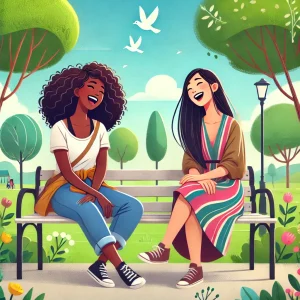
ADHD women and Friendship: 5 Tips to Help you Find Your Tribe
If you’re an adhd woman, you have probably found making friends hard. It’s not that you don’t want to connect with others or that you lack the ability to form meaningful relationships. Instead, you experience social dynamics differently, and that’s okay. Understanding this can be a powerful step toward building the friendships you desire.
Why ADHD Women Have Trouble with Friendships
Many ADHD women experience a sense of feeling "different" from their peers, particularly when surrounded by neurotypical individuals. You might find it hard to pick up on the way female friends want you to read social cues or struggle to express your thoughts and feelings in a way that feels natural. Engaging in back-and-forth conversations may also feel challenging at times because it's not how you communicate best.
Your emotions might run deep, making you incredibly empathetic and capable of forming profound connections. However, these intense emotions can also lead to misunderstandings if others don’t fully grasp where you’re coming from. And when it comes to staying in touch or following through on plans, difficulties with time management and organization might sometimes get in the way. Remember, these are not flaws—they are simply part of your unique way of interacting with the world. Others may not understand this.

Embracing your social style with self-compassion and self-awareness can help you find a community of femal friends where you feel accepted and understood.
Five Tips For ADHD women to Have Better Friendships
Seek Out Neurodivergent Communities

One of the most empowering things you can do as a neurodiverse person is seek out other neurodivergent people who share similar experiences and understand your unique perspective. Connecting with others who “get it” can make a huge difference. By finding a supportive community—whether through ADHD support groups, both online and offline, or through activities and hobbies that attract neurodivergent individuals—you can build a network of friends who appreciate you for who you are.
Being around people who share your experiences can reduce feelings of isolation and help you feel more comfortable being yourself. Spaces where you can relax, knowing you’re accepted without having to mask your true self or conform to neurotypical standards are healing.
In these environments, you can be yourself and be at ease in social interactions. This is how it's meant to be.
Focus on Shared Interests
Building friendships often feels easier when you connect over shared interests. Think about what you’re passionate about and look for clubs, groups, or online communities that revolve around these interests. Whether it’s a book club, an art class, or an online forum, finding people who share your enthusiasm or special interest can provide a natural foundation for connection.

When you engage in activities that you love, you’re more likely to meet people who think like you and value similar things. This can make conversations flow more easily and help you build rapport and camaraderie. It’s also an excellent way to practice self-awareness—recognizing what brings you joy and finding others who share that joy can help you build deeper, more meaningful friendships.
Embrace Authenticity and Self-Compassion
It’s easy to feel pressured to hide your ADHD symptoms or try to fit into neurotypical expectations, but this can be exhausting and lead to feelings of burnout and anxiety. Remember, you don’t have to mask who you are to be a good friend or to be accepted by others.
Being authentic—letting your true self shine, quirks and all—can lead to more genuine and fulfilling connections.
Practicing self-compassion means being kind to yourself and acknowledging that it’s okay to be different. You don’t have to change who you are to fit in.
Instead, focus on finding people who value your authenticity and who will appreciate you just as you are. By embracing your unique qualities, you can build stronger, more honest relationships where both you and your friends feel understood and valued.
I know this feels impossible. Take it one step at a time.

Practice Self-Care and Seek Support
Friendships require energy, and it’s important to take care of yourself to maintain them. Practicing self-care is vital for managing the emotional and social demands that come with maintaining relationships. Whether it’s setting aside time to recharge, engaging in activities that help you relax, or seeking professional support from a therapist who understands ADHD Women, prioritizing your well-being can help you be more present and engaged in your friendships.
Remember that self-care also involves setting boundaries and recognizing when you need to step back to recharge. By taking care of yourself, you’re better equipped to be there for your friends in a meaningful way. Seeking support, whether from a therapist or a trusted friend, can also provide guidance and understanding, helping you navigate the complexities of friendships with greater ease.
Be Patient and Understanding
Building strong, lasting friendships takes time, and it’s important to be patient with yourself and others. Not every connection will turn into a deep friendship, and that’s okay. Give yourself grace and extend the same understanding to others. Remember, everyone has their own quirks and challenges, and friendships are a two-way street. By practicing self-advocacy and communicating your needs clearly, you create an environment where both you and your friends can thrive.
Being a supportive, understanding, and attentive friend yourself is a great way to attract people who value those qualities. With patience, self-compassion, and a focus on being your authentic self, you can build a social circle that celebrates your uniquenes, gives you empathy, and supports you as you navigate your journey as an ADHD women.
By embracing these strategies, adhd women can foster meaningful friendships that are grounded in understanding, acceptance, respect, and authenticity. Remember, the goal isn’t to change who you are to fit in but to find those who love and appreciate you for exactly who you are.




